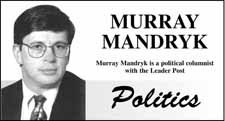A series currently running on the history channel entitled "America, the history of the U.S." recently aired one particularly thought-provoking episode.
The episode in the 12-part series covered the period from the post-civil-war to the settling of the American West, that included the building of that nation's trans-continental railroad and the displacement of the American Indian to reserves as hunters slaughtered the massive buffalo herds and the horrific drought, fires, floods and insect infestation that early American West farmers endured so as they could hold on to the free land they were given. At least some of this history should be familiar to us in Western Canada.
One aspect perhaps less familiar is the development of the American cowboy. Contrary to all those Western movies that we all grew up on, a third of these cowboys were Hispanic, while another third were freed black slaves escaping freedom to place of equality.
The greatest equalizer, however, was the Colt .45 pistol that was a must-have for the cowboys, despite the fact that its $17 cost at the time was half a month's wages. From that handgun grew an even greater sense of independence and freedom that Americans now so cherish. There are an estimated 60 million guns today in Texas alone, the program stated.
Of course, we in Western Canada were shaped by a considerably less dramatically violent history. That said, we do share an attachment to openness, freedom, independence and individualism that may somewhat more resemble that our American cousins to the south that our fellow countryman to the east.
In wake of our country's recent celebration of our 144th birthday and America's 235th birthday, it's a thought worth considering.
This is not a lament that Western Canadians need - or even want to be - more like Americans. The vast majority of Western Canadians are extremely proud that our nation was built on its philosophy of peace, order and good government rather than America's life, liberty and pursuit of happiness. We in the West also generally subscribe to the more conciliatory, co-operative approach upon which Canada was founded - one that allowed room for the growth of public health care and Crown-own services.
And in the finest Canadian tradition we avoid being overly boastful or proud about it all, choosing a more measured, humbler form of patriotism.
But that there is a resistance elsewhere in our country to Western Canadians - at least on certain matters - being able to hold a few views and opinions that may vaguely resemble that of Americans is puzzling. Sadly, Canadians are sometimes less accepting and tolerant than they claim to be.
It shouldn't be this way. We in Western Canada should simply quit apologizing for having slightly different views than our countryman in other regions on issues like gun ownership and registration or perhaps even the requirement of selling grain through the Canadian Wheat Board rather than marketing it ourselves.
Of course, there isn't complete unanimity on these issues even within our region. Nor is our attachment to some issues completely rational. After all, most of us in Western Canadian don't sell crops for a living. And despite the fact that there remains majority opposition in Western Canada to the gun registry, most of don't own guns.
But that's fine, too. If somewhere in our Western Canadian DNA there are a few similar threads to the rugged individualism that defined the America West, we shouldn't have to apologize for it.
There is no one right way to be a Canadian. Nor can there be one exclusive set of Canadian values in a land this big.
We are who we are. And who we are, is based on what we believe, which is often shaped by our land and history.
That's at least one lesson we all should borrow from American history.
Murray Mandryk has been covering provincial politics for over 15 years.




